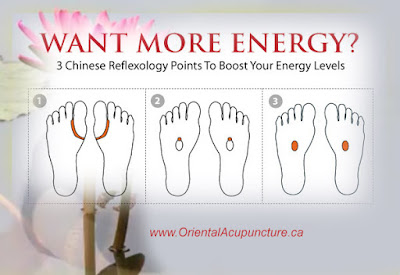Most of our patients who complain of fatigue suffer from a deficiency of vital energy (Qi).
In Traditional Chinese Medicine, Qi is the basic energy that creates optimal physiological and neurological function.
The signs of Qi deficiency includes:
- Fatigue
- Diarrhea
- Pallor
- Easy bruising
- Excessive sleep (more than 9 hrs. a night)
- Scanty menses or amenorrhea
- Frequent urination
- Low libido, and shortness of breath.
The most common causes are stress, overwork, insomnia, depression, and various malfunctions in the major systems of the body (endocrine, cardiovascular, digestive, etc.) . There are many wonderful alternative treatment options that include acupuncture, herbs, nutrition, and exercise. Acupuncture tops the list because it tends to be so effective is supplementing the body’s energy.
3 Acupressure / Reflexology Points to BOOST your Energy Level
The strategy of Chinese medicine is to identify a pattern of disharmony that reflects the entirety of one’s symptoms, pulse qualities, and tongue appearance. After the diagnosis or assessment, our licensed and experienced TCM acupuncturists usually recommend once or twice weekly acupuncture treatments for 4-6 weeks. Combining with reflexology is also a great option for boosting your energy level.







.jpg)